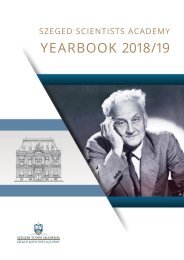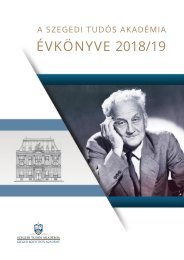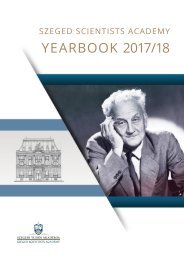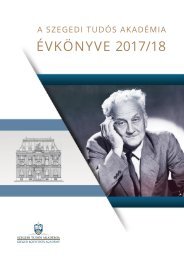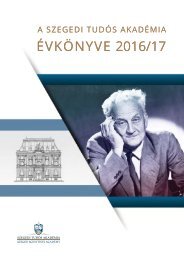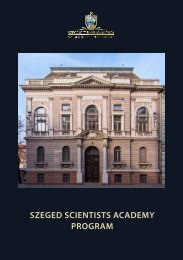SzSA YearBook 2016/17
Create successful ePaper yourself
Turn your PDF publications into a flip-book with our unique Google optimized e-Paper software.
SZENT-GYÖRGYI STUDENTS<br />
ARMAND RAFAEL BÁLINT<br />
Szeged Scientists Academy, 2 nd year<br />
University of Szeged,<br />
Faculty of Medicine, 2 nd year<br />
E: balint.armi71@gmail.com<br />
T: +36 70/324-3542<br />
DATE OF BIRTH:<br />
1996<br />
SZENT-GYÖRGYI PUPIL:<br />
yes<br />
SZENT-GYÖRGYI MENTOR:<br />
Dr. Eszter Farkas<br />
SPECIALTY:<br />
neurophysiology and<br />
cerebrovascular physiology<br />
SECONDARY SCHOOL:<br />
Radnóti Miklós Experimental<br />
Grammar School, Szeged<br />
NAME OF TEACHER:<br />
Éva Fazekasné Gulyás<br />
LANGUAGES:<br />
English/intermediate<br />
IMPORTANCE, AIMS AND POSSIBLE OUTCOME OF RESEARCH<br />
Brain injuries as a result of stroke can have devastating effects on the patients’<br />
quality of life, and they impose a heavy burden on the health care system. The<br />
resultant neurological deficit obviously depends upon the severity and nature<br />
of the initial injury, but also upon secondary and progressive deleterious events,<br />
such as waves of brain cell malfunction that propagate across the regions surrounding<br />
the initial brain lesion. Our research activities focus on various aspects<br />
of the pathophysiology of cerebrovascular diseases in experimental models to<br />
understand the progression of secondary neuronal injury. Our specific aim is to<br />
understand the impact of old age on the severity of ischemic brain injury. This is<br />
a highly relevant question, taken that cerebrovascular diseases predominantly<br />
occur in the aging population. We rely on a new and powerful experimental strategy:<br />
real-time imaging of fluorescent tracers in combination with blood flow<br />
imaging to show how spreading depolarization, cellular biochemistry and perfusion<br />
evolve within the affected brain region. Our findings are expected to help<br />
identifying novel treatment targets in stroke.<br />
AIMS DURING HIS CAREER<br />
I would like to contribute to an important discovery in neuro- and cerebrovascular<br />
physiology during my carrier. Furthermore, I would like to be acknowledged<br />
by other researchers working in my field of science. My main motivation is to<br />
produce scientific results which can lead to the development of more effective<br />
therapies and techniques.<br />
HONORS AND PRIZES<br />
–<br />
PUBLICATIONS<br />
–<br />
96






